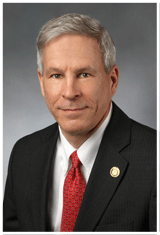Saint Louis, Mo. — Missouri is on the cutting edge of some legislative issues and woefully lagging behind in others. Voters in 2014 will get a chance to see both as the primary date rapidly approaches and lawmakers begin to weigh possible override votes of Gov. Jay Nixon’s record number of vetoes.
Missouri was technically the first state to pass a “Right-to-Try” law. Missouri beat all other 49 states in the union in putting the bill on Gov. Jay Nixon’s desk. Had he signed it the day he got it, Missouri would have been the very first state to do so.
The bill expands access to experimental drugs and treatments for those with a terminal illness. Nearly a dozen other states now have “Right-to-Try” movements in their state capitols.

“Right-to-Try” isn’t the only medical issue Missouri moved on this year. A bill allowing access to a certain kind of hemp oil — known as CBD oil — got Nixon’s signature only last week. The bill allows patients with certain types of epilepsy access to the hemp oil, which has shown to be remarkably affective at reducing frequency and severity of seizures.
Colorado currently allows access to CBD oil for medical purposes and a small number of states, including Nevada, are expected to debate the issue in their state legislatures again next year. Missouri lawmakers passed the bill in less than 30 days.
Sen. Rob Schaaf and Rep. Paul Curtman are also looking to make a dent in history. Schaaf and Curtman are leading the charge on Amendment 9. If approved by voters, it would amend the state constitution to include personal digital communication data under the protections afforded by the Fourth Amendment’s prohibition of warrantless searches and seizures.
No other state has language has broad as Missouri’s which would include nearly all of a citizen’s digital information. A ruling just a few weeks ago from the Supreme Court expanded Fourth Amendment protections to cell phones, but Schaaf said Amendment 9 — which its inclusion of laptops and all communications — is an even stronger protection.
Schaaf isn’t just close to a new, budding issue. The St. Joseph physician is also one of a handful of lawmakers in Missouri blocking the creation of a prescription drug database. The issue has been debated so long in Missouri to no avail that the Show-Me state is now officially the only state in the country with no prescription drug database for the purposes of tracking fraud and abuse.
And Schaaf’s involvement doesn’t stop there. Missouri s also the only state that hasn’t closed what big cigarette companies call a “loophole” in their Master Settlement Agreement reached with all 50 states. The agreement stipulates all cigarette companies pay into an escrow account for the states, but doesn’t include cigarette manufacturers that didn’t exist when the agreement was signed. Cigarette companies say this gives smaller companies a distinctive competitive advantage in the market.
Despite considerable time and attention during the last legislative session, Missouri lawmakers couldn’t be persuaded to close the loophole, costing the state more than $70 million in uncollected revenues. Opponents of the change say that closing the loophole amounts to a new tax on small businesses, something Republican lawmakers and their conservative constituents just cant stomach.
Missouri will also be looking to add some of the broadest legal protections to the agriculture industry in August. Amendment 1, known by supporters as “Right to Farm” would provide that “the right of Missouri citizens to engage in agricultural production and ranching practices shall not be infringed.”
Supporters call the bill a landmark move to stop burdensome regulations supported by the groups like PETA and HSUS. Opponents, however, say the bill will make it almost impossible to seek legal recourse against large corporate farm operations that pollute the land or sell contaminated their products.
Collin Reischman was the Managing Editor for The Missouri Times, and a graduate of Webster University with a Bachelor of Arts in Journalism.



